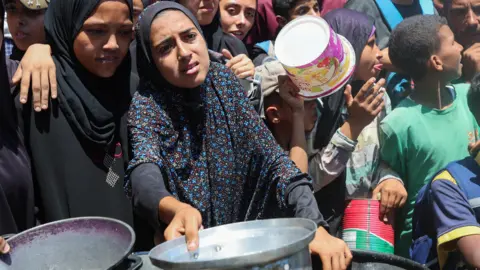The humanitarian crisis in Gaza has reached staggering levels, with the United Nations Food Programme (WFP) reporting that nearly one-third of the population is going days without food. This distressing situation is exacerbated by the ongoing conflict and restrictive measures that impede the flow of essential supplies into the territory. The WFP has highlighted an alarming surge in malnutrition, particularly among vulnerable groups, with approximately 90,000 women and children urgently in need of medical assistance.
As the situation deteriorates, the death toll attributable to malnutrition is climbing. Reports from Gaza’s Hamas-run health ministry indicated that on one recent Friday alone, nine additional malnutrition-related fatalities were recorded, bringing the cumulative toll to 122 since the onset of hostilities in October 2023. The dire circumstances underscore the pressing need for international intervention and substantial humanitarian support.
Israel, which exercises tight control over all supplies entering Gaza, has maintained that there are no restrictions on aid delivery and has attributed the ongoing malnutrition crisis to Hamas’ governance. In a related statement, an Israeli security official hinted at the possibility of airdropping aid into Gaza in the coming days. However, aid organizations have previously expressed skepticism about the efficacy of this method, arguing that it may not address the severe needs on the ground effectively.
The urgency of the humanitarian conditions has drawn international attention, with representatives from Germany, France, and the United Kingdom jointly calling for the immediate removal of restrictions on aid delivery to Gaza. Their statement highlighted the unacceptable nature of withholding essential humanitarian assistance from civilians and called for adherence to international humanitarian law during the ongoing conflict.
Condemnations of inaction from the international community were voiced by UN Secretary-General António Guterres, who lamented the apparent apathy shown by many nations in response to the disaster unfolding before them. He noted the grim reality that since late May 2023, over 1,000 Palestinians have lost their lives while trying to access food supplies amidst the ongoing crisis.
In a troubling testimony from a US security contractor who had worked with the Gaza Humanitarian Foundation (GHF) earlier this year, allegations emerged of severe violence against civilians. Anthony Aguilar described witnessing the use of live ammunition and artillery by Israel Defense Forces (IDF), indicating that such actions constituted war crimes during food distribution operations.
The GHF has dismissed Aguilar’s claims, labeling him a disgruntled former contractor who was let go for misconduct. This dispute sheds light on the complications and contradictions surrounding aid delivery and the humanitarian situation in the region.
Efforts to establish a ceasefire and reach a new deal regarding hostages remain in disarray, particularly after the United States and Israel withdrew their negotiating teams from Qatar. President Donald Trump commented on Hamas’ alleged lack of interest in negotiations, suggesting that the group was more inclined toward conflict. The recovering peace talks have raised hopes that negotiations could nonetheless resume, as a senior Hamas official indicated that mediators had informed them that discussions had not entirely broken down.
Since the initiation of hostilities, Israel has consistently cited security threats as justification for its military actions and the blockade on Gaza. However, these measures have resulted in indiscriminate suffering among civilians, with vast numbers displaced and infrastructure severely damaged. As of now, over 90% of homes in Gaza are reported to be either damaged or destroyed, and with the psychological and physical toll of the conflict mounting, the humanitarian consequences remain dire.
In a significant development, the French government pledged to officially recognize a Palestinian state, a move that was met with opposition from Israel and its ally, the United States. Additionally, UK MPs have shown support for similar recognition, reflecting shifting perceptions on the Palestinian issue within the international community.
The situation in Gaza remains precarious, as ongoing violence and humanitarian restrictions lead to increasing starvation and suffering among its inhabitants. The call for global compassion and intervention has never been more urgent.












